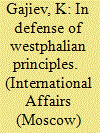|
|
|
Sort Order |
|
|
|
Items / Page
|
|
|
|
|
|
|
| Srl | Item |
| 1 |
ID:
164207


|
|
|
|
|
| Summary/Abstract |
SWEEPING CHANGES of epochal dimensions are caused by the deep-cutting shifts in the most important spheres of social life at the national, regional and global levels, protracted social and economic crises, wars, disintegration of the old and emergence of new ambitious powers, etc. These shifts marked essential stages in the development of international political systems; they were responsible for the disintegration of great civilizations, empires, world powers, and the corresponding world orders. In October 1648, the Westphalian system, the product of the Peace of Westphalia, ended the Thirty Years' War in Europe and buried Roman Catholic universalism and the Holy Roman Empire. The balance of power, the system formulated by the Vienna Congress of 1815, that rested on Westphalian principles was built up on the ruins of Napoleon's empire. The Versailles-Washington system is the product of World War I that destroyed the Austro-Hungarian and Ottoman empires and detached big chunks from the territory of the Russian Empire. The bipolar world was one of the results of the rout of the Third Reich and the Land of the Rising Sun in World War II. In the final analysis, this war delivered a fatal strike to the great colonial empires of Great Britain, France, the Netherlands, and Portugal. Here I will try to identify and analyze systemic and structural components of the so-called liberal or unipolar world order that replaced the bipolar world order when the Cold War had ended and the Soviet Union with its history of triumphs and failures had disintegrated.
|
|
|
|
|
|
|
|
|
|
|
|
|
|
|
|
| 2 |
ID:
157253


|
|
|
|
|
| Summary/Abstract |
WITHOUT EXCEPTION, the tectonic shifts now taking place in the infrastructures of today's world under the conditions of globalization and the information and telecommunications revolution are together leading toward a radical change in the place, role, and influence of nations and peoples in the system of international relations. It is therefore natural to expect a gradual rethinking of the traditionally understood categories of world order, hegemony, dominance and submission, the places and roles of small nations, the character of the configuration of geopolitical forces, and so on. Of special relevance are the status of and outlook for the superpowers, and the phenomenon of superpower status itself. As is well known, against the backdrop of the triumph of the West and the United States, there was originally the conviction that a so-called unipolar world order had arrived, at the summit of which Uncle Sam was enthroned in splendid isolation.
|
|
|
|
|
|
|
|
|
|
|
|
|
|
|
|
|
|
|
|
|